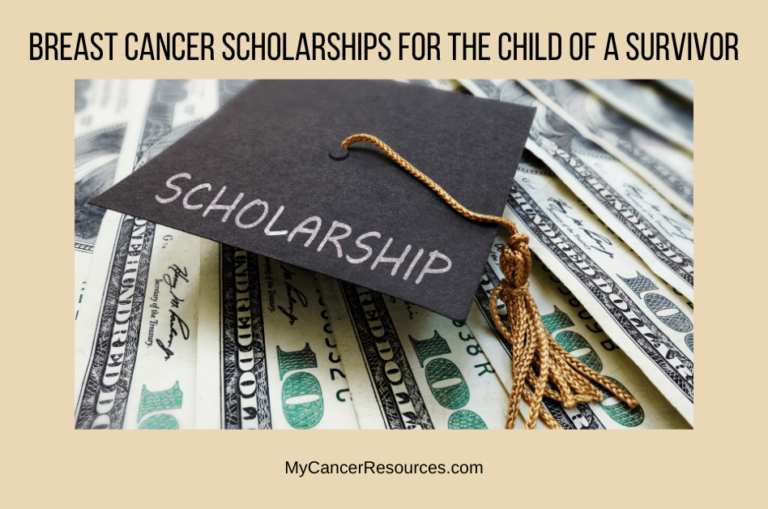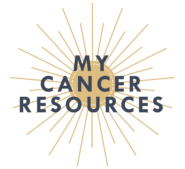
Spring has finally sprung, and high school seniors and their parents really start to focus on graduation and moving to the next phase of life for many: college.
With that can also come worry about covering the cost of higher education, especially for families who have already dealt with financial strain from a cancer diagnosis.
Today I’m going to list some specialized scholarship opportunities that may help reduce some of those costs. This post will focus on breast cancer: scholarships for the child of a survivor.
Future posts will be about cancer related scholarships in general, not related to a specific diagnosis, and scholarships specifically for childhood cancer survivors or young adult cancer survivors.
According to the Education Data Initiative, the cost to attend an in-state, 4-year state college, is on average $26,027 per year, or $104,108 for the entire 4 years. It costs about $223,360 for the same timeframe at a private university.
College scholarships can make earning a college degree a possibility for families who have faced a life-threatening disease.
Cancer care in particular is especially expensive, and can quickly drain financial resources.
This shouldn’t mean that a student has to give up on their dream of earning a degree.
Student scholarships can offset a chunk of expenses, making it a little bit easier to find other sources of financial assistance like grants and student loans along with personal savings to pay for school.
Let’s explore specific scholarships for the child of a breast cancer survivor, and then we’ll discuss tips on how to make your scholarship application stand out.
Some Info Before We Begin...
It’s important to understand that each scholarship has it’s own set of rules and eligibility requirements, and you’ll need to read the fine print of each before starting the application process so you don’t waste your time or theirs.
Some of these scholarship resources are available to students living all over the United States (and some even to those in Puerto Rico), and others are specific to a geographic area.
Most require applicants to be U.S. citizens or a permanent resident.
Many, though not all, of the list of scholarship opportunities listed below are open to high school students only, preparing to be undergraduate students at a 2 or 4-year college or university.
Note that scholarships often depend on current funding at each organization, and may not be available every year.
An Interesting Non-Scholarship Opportunity
While researching to write this post, I came across this opportunity available to all teens in grades 9 – 12.
It’s an essay writing contest, and since it’s a contest, if you win, the $1,000 prize money doesn’t have to go towards educational expenses – you can spend it however you want!
It’s the Cancer Unwrapped Teen Essay Writing Contest. Entrants submit an original essay of less than 1,500 words as a response to the following prompt:
“Learning about a cancer diagnosis – your own or that of a loved one – can cause a storm of emotions, and everyone experiences it differently. We want to know what this experience was like for you. Did you feel angry, sad, lonely, or maybe something you didn’t expect? What happened in your life, and did it change you or your perspectives?”
Winners will be invited to a virtual reception and asked to read their essays.
I’d encourage any reader who is eligible to submit an essay – writing about and sharing your experiences can be not just an important part of your own healing process, but can also help others!
And you can win money in the process – even better!
Breast Cancer Scholarships for the Child of a Survivor
Ambient Edge Students Affected by Cancer Scholarship – $1,000; this scholarship is for students who have stood by a loved one with cancer, or who have had cancer themselves. Applicants must be high-achieving incoming first-year students, undergraduate or graduate students with a 3.0 GPA. Along with the application form, transcripts and a 500-1000 word essay must be submitted.
Dr. Angela E. Grant Memorial Scholarship Fund – up to $5,000; up to 3 scholarships awarded each year for those affected by cancer and who are dedicated to community service and celebrating the spirit of life. Eligible applicants are high school seniors or current college students who exhibit leadership, community involvement, exemplary character and high academic standards.
An essay is also required outlining personal achievements and career goals. Applicants must either be a cancer survivor who is actively pursuing or planning to pursue a college education in any field of study or be an applicant with an immediate family member who has been diagnosed with cancer.
Indiana Breast Cancer Trust Nancy Jaynes Memorial Scholarship – up to $2,500; available to Indiana high school seniors attending an Indiana college or university or post-secondary technical school who have lost a parent to breast cancer or have a parent currently undergoing breast cancer treatment. Scholarship award winners are eligible to apply for continuation scholarships up to three consecutive years, for a total of $10,000.
In the Middle – offers two different scholarships to high school seniors in good academic standing (2.5 GPA) and who demonstrate financial need. The Nichel Holland-Swindler Scholarship is $500 for a child of a parent diagnosed with breast cancer. The Laurin Long Bank Scholarship is for $1,000 for the child of a parent who died from cancer. Applicants must complete an essay describing how their parent’s battle with cancer impacted their life and what they learned about themselves and/or their parent from the experience.
Jennifer Casey Alderman Legacy Scholarship – $2500; this is an annual scholarship for up to a total of $10,000 as long as the student maintains a 3.0 GPA in college. Eligible applicants are a young adult who has lost a parent to metastatic breast cancer or has financial hardship due to a parent currently living with metastatic breast cancer and wishes to seek a higher education as a post high school graduate. Available to those living in IN, KY, OH or TN. To apply, you’ll submit a written essay about the subject of your choice, no more than five pages in length.
Jon Grove Memorial Scholarship – $2,500; for high school seniors attending a Howard County, MD public school whose life has been impacted by cancer, either personally or within their immediate family.
Life Lessons Scholarship Program by Life Happens – unknown scholarship amount; for this scholarship, high school seniors or college students submit an original 500 word essay or 3 minute video discussing how the death of a parent or guardian affected their life financially and emotionally.
Mary Ellen Locher Scholarship Fund – unknown scholarship amount; available to the children of breast cancer patients – either survivors, those currently in treatment, or deceased. Must live within 50 miles of the Chattanooga, TN area. Recipients are selected on the basis of eligibility and essays.
Community service, grades, and financial need will also be considered, but grades will not play a dominant role in the selection process, because they understand that dealing with cancer in a family member may impact a student’s academic performance.
Scholarship winners are required to participate in at least one breast cancer awareness project during the school year they receive a scholarship. Recipients may complete this requirement on their own or join with the MaryEllen Locher Foundation or other organizations in fulfilling this requirement.
Miles of Hope Breast Cancer Foundation Scholarship – $1000; Applicants must reside within one of the nine New York State counties served by the Miles of Hope Breast Cancer Foundation. These include: Columbia, Dutchess, Greene, Orange, Putnam, Rockland, Sullivan, Ulster, and Westchester counties. Scholarship recipients must have been affected by breast cancer and be a high school senior planning to attend an accredited college or trade school, or an eligible college student.
National Collegiate Cancer Foundation Legacy Scholarship Program – $1000; a one-time scholarship to young adults pursuing their education who have lost a parent or legal guardian to cancer. Applicants will be evaluated based on the following criteria: Journey, Encouragement, Financial need, Notable Accomplishments and Quality of Recommendations
Pink ImpACT– $1,000; Pink ImpACT Foundation selects scholarship recipients based on their 200 word essay on “How Breast Cancer Has Affected Their Life.” Once selected, Pink ImpACT Foundation presents the awardee $1,000 and a scholarship certificate at the high school awards ceremony. The scholarship awarded can go toward a degree plan or a vocational college.
PinkRose Foundation – $1,000; several scholarships are offered each year to children who have lost a parent to breast cancer.
Sandra M. Glazier Scholarship Fund – up to $5,000 per year for up to 4 years of full time study at an accredited college, university or vocational school ($20,000 total); for a student attending high school in Ocean or Monmouth County, NJ with a parent who has been or is battling cancer, or they themselves must be battling cancer.
Recipient is chosen based on financial need, academic excellence, community service, extracurricular activities, leadership and work experience.
Tom Olen Memorial Scholarship – unknown scholarship amount; eligible applicants are Massachusetts residents in their senior year of high school who have been affected by cancer. An application and 350-word essay highlighting the experience with cancer and future career/personal ambitions is required.
United Breast Cancer Foundation Fund’s Audrey B. Mastroianni College Scholarship – unknown scholarship amount; for current college students only or those already accepted to college (not those in the college application process) who have experienced the loss of a parent to breast cancer.
How to Find Additional Scholarships for the Child of a Breast Cancer Survivor
Local scholarship funds are often overlooked, as people typically look to large, national organizations for help.
One of your first stops might be to contact your oncology social worker. If there are local organizations that offer scholarships to a four-year college, community college or vocational school, they will likely know. Some applications may even need letters from a social worker or other medical professional verifying your family’s situation.
Though they don’t offer scholarships themselves, your local branch of the American Cancer Society may know of other grants of scholarships to relieve the financial burden of earning a bachelor’s degree.
Guidance counselors from school, or librarians can also be a great help in searching for opportunities that offer a financial award to help cover educational costs.
Search for non-cancer related scholarships, too. There are some based just on grades, some for students who have put in hours of community service over their high school years, and even scholarships just for people who are left-handed!
Apply to all scholarships that you are eligible for. Some students will think a scholarship for “only” $500 isn’t worth their time applying.
But if you’re eligible, and take the time to apply, it may have a really small pool of applicants, and you have an even better chance at being selected!
Each financial support award adds up, making it even less money that you have to pay out of your own pocket for school.
Application Tips for Success
Facing the application process for scholarships can seem overwhelming. You want your submission to resonate with scholarship providers. Here’s how you can stand out.
- Be very organized – there will be a lot of moving parts to keep track of. Write important deadlines on a calendar and work backwards to see when specific requirements need to be completed in order to not miss the deadline.
If an application packet needs to be mailed in, be sure to allow for extra time for it to arrive before the deadline. Applying well before the application deadline can make a good impression on the review committee.
Prioritize applying for scholarships that have the closest deadline, so you don’t miss out on an opportunity because you didn’t submit everything on time. - Craft a personal essay that tells your unique story. This isn’t just about sharing the challenges you faced; it’s about sharing how you’ve grown from the experience.
Highlight the life lessons learned through tough times. How did your family member’s diagnosis push you to reach your full potential in the face of adversity? These insights offer a glimpse into your resilience and character, traits that scholarship committees admire. - Take the time to write, edit and revise your essay. Have others review your work and offer suggestions for improvement. Refining your essay can make the difference between an average one and one that really wows the review committee.
- Your letters of recommendation can speak volumes. Choose people who know you well and can vouch for your academic achievement, community service involvement, and personal qualities.
Conclusion
Just because you’re a child of a breast cancer patient or survivor, or have lost a parent or guardian to breast cancer doesn’t mean that you have to give up on a dream of going to college because money is tight.
There are specific breast cancer scholarships for a child of a survivor or former patient. Start with this list provided here, and then continue your research for additional funding opportunities.
You may need to piece together a few different pots of money, from personal savings, earnings from flexible gigs, scholarships, grants, student loans and even work-study opportunities and paid internships, but it is possible.
Ideally, you’ll be able to secure grants and scholarships to cover most of your school expenses.
Don’t give up before you start – search for as many opportunities as you can find, be creative, and you can find a way to make it work.
Good Luck!



